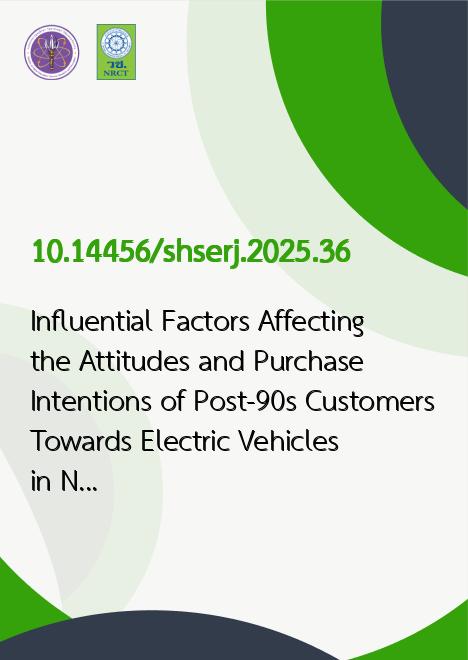
|
Influential Factors Affecting the Attitudes and Purchase Intentions of Post-90s Customers Towards Electric Vehicles in Nanning, China |
|---|---|
| รหัสดีโอไอ | |
| Creator | Haoning Song |
| Title | Influential Factors Affecting the Attitudes and Purchase Intentions of Post-90s Customers Towards Electric Vehicles in Nanning, China |
| Publisher | Assumption University Press |
| Publication Year | 2568 |
| Journal Title | The Scholar: Human Sciences |
| Journal Vol. | 17 |
| Journal No. | 2 |
| Page no. | 54-66 |
| Keyword | Consumer Attitude, Perceived Ease of Use, Purchase Intention, Environmental Protection, Personal Innovation Ability |
| URL Website | https://assumptionjournal.au.edu/index.php/Scholar/article/view/8015 |
| Website title | https://assumptionjournal.au.edu/index.php/Scholar |
| ISSN | 2586-9388 |
| Abstract | Purpose: This study investigates the factors influencing consumer attitudes and purchase intentions toward electric vehicles in Nanning. The primary focus is on exploring the causal relationships among perceived usefulness, perceived ease of use, compatibility, personal innovation, environmental awareness, environmental attitude, and behavioral attitude. Research design, data, and methodology: This study utilizes quantitative research methods with a sample size of 500 and conducts a questionnaire survey targeting the post-90s population in Nanning City. Non-probability sampling methods are employed, initially utilizing a targeted approach to select participants from three prominent shopping malls in Nanning City. Subsequently, a stratified random sampling method establishes sampling quotas for each mall, enabling data collection online and offline. The analysis involves Structural Equation Modeling (SEM) and Confirmatory Factor Analysis (CFA). Result: The research reveals that perceived usefulness, ease of use, compatibility, personal innovation ability, environmental awareness, environmental attitude, and behavioral attitude significantly impact consumer purchase intention. Notably, behavioral attitude emerges as the most influential factor, while compatibility, although the least impactful, still significantly affects consumer purchase intention. Conclusion: Managers of new energy vehicle brands can devise tailored strategies based on these evaluations to enhance the attitudes and willingness of post-90s consumers to purchase new electric vehicles. |
